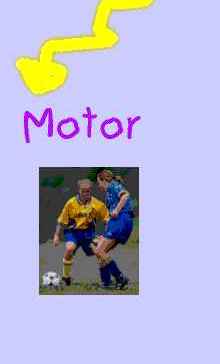|
Advertising/sponsorship
above is selected by Angelfire.com and may not represent my views.
|
|

|
| Back
to Today's Child |
Back
to the Discipline Page |
|
Guiding Self-Discipline: Spanking
???? |
|
"But I turned out okay, and I was spanked!"
"My grandfather spanked his kids and they aren't murderers"
"These kids these days.... what they need is a good spanking!"
"Kids need to know that if they do something wrong there are
consequences!"
"They need to respect their parents!"
"I've tried everything else, and nothing works."
"A quick spanking, and they get the point!" Ever
heard these comments before? Ever said them? Let's have a
look at the issue of 'spanking'.
|
|
Why do people spank
their kids?
|
| Anger |
Acting out of anger is a scary
thought. It is also a sad thing we do. Not only
because of our actions, but also because of how it affects our
children. When in the state of anger, we are not in
control.. We no longer are listening, we no longer are thinking
rationally, and we typically do things/say things we wouldn't do
when not angry. |
Something to think about
Can you imagine the terror a child must feel when someone is
threatening them, attacking them? Can you imagine what a
child feels, wondering when the next episode will be, when they
will be spanked again? How they must feel when they see that hand
raised. And how they must feel about themselves -- thinking they
deserve to be
hurt? How sad it is, to think of a child
fearing their parent, or worse yet, thinking they deserve to be
hurt.
If a child can't feel
safe with a parent, who can they feel safe with?
Also... what is the lesson the kids are getting? "When you are
angry, it is okay to hit someone." When someone does
something "wrong" --hit them. Is this how you want them to
handle problems?
|
What to do?
Anger management: it is okay to be angry, but it is not okay to
hit.
Stay in control! Count to 5, or 10, or 200 before acting.
Know the cues that tell you anger is being triggered. What is
behind the anger? Other feelings are the basis of anger. Is it
disappointment? Frustration? Tired? Unfulfilled? Deal
with these, and the anger will disappear.
Visit the STRESS
page for more information.
|
| Fear |
A young child goes to run out on
the street; we catch him just in time; we have envisioned him hit by a
car. Panic Attack!! He could have been killed. Spank. Protecting them, at all costs.
Yes, we want the children to understand safety. Yes, we want them to have self-control when they are eager to get
somewhere, or do something. Yes, we want them to be
thinking. Yes,
they need to understand the situation was dangerous, but is a
spanking the way this message can get across? And does
it get the messages across? |
Something to think about
How traumatic... out of the blue they have been grabbed, possibly
seen a car "up close and personal", they are
scared, and on top of that
are getting spanked. They too are going through a traumatic
experience and we add physical and emotional pain to it?
Put yourself in their shoes for a moment: how are they feeling?
Scared? Confused? Shocked? What do they think you feel about them?
And what is the lesson? Maybe it is "don't worry about the car...
worry about the spanking you will get!"
Are we helping them
truly understand the situation..... or are we just teaching them
"street = fear" ?Having facilitated parenting
programs at correctional institutes I have seen the young men who
have been taught to think about the punishment. Don't steal
or you will go to jail. FEAR. Don't hit or you will be
punished. FEAR. And yet there they are in jail because
of stealing and assault. We want our children to not steal
because it it wrong, not out of fear. We want them to not hit,
because it is wrong, not out of fear. Spanking teaches fear,
not self-discipline.
|
What to do?
First.. stay in control. As stated above, when we are reacting to
our emotions we are no longer thinking rationally.
Secondly.. consider this: child runs out on the street. You run
and grab him and return him to safety. You hug him tightly
and say how scared you were. You tell him that it is not
safe to run out on the street. You hug him again and tell him how
glad you are that he was not hurt. You then take his hand and walk
through proper street-crossing procedures.
Do you think he got the message that it was dangerous? Did he get
the message that you care about him and was scared? Did he have a
lesson on learning how to control himself when wanting to crossing
the street. How has this affected his self-esteem? His
relationship with you? Spanking
rips away at a child's self-esteem.
|
| Guilt |
"I have to be a good
parent. My child has to respect his elders. I don't
want my child to grow up to be one of those "bad
ones". I have to teach him now. If I don't make
him obey, I'm not a good parent." |
Something to think about
Kids that are "out of control" are not that way because
they weren't spanked. It may seem that way, but if we were able to
look closely at their lives we would probably find that the adults
in their lives aren't meeting their needs --motivations--what they want, how they need to be taught.
Typically, what kids do is act out to get their needs met --
whether that be control over their lives, expressing emotions,
seeking attention, or
something else. If you ask a gang member why
they joined the gang, you will probably here them say "they are my
family". Their need for "love and belonging"
has not been met at home or school, and so they turn
elsewhere. We may think we are providing the love they need,
but there are many ways to express love -- some of us need it one
way, and others need something different. The trick is to
find out what our children need and provide it. And that includes
clear boundaries.
|
What to do?
Teaching children how to set limits, live within set limits,
communicate properly, negotiate, and maintain a positive
self-esteem are the cornerstones of self-discipline. Consistency, honesty, respect, and following through with
statements provides the structure and the boundaries that children
need.
Say what you mean, mean what you say, and do what you said
you will do.Follow your beliefs. Know what you want,
where you are headed. Be proud of yourself as a parent. We
do the best we can, given the information we have, given the
situation we are in, given the mood we are in, the amount of
'stress' we are dealing with. Make decisions in your life, don't
just let life drag you along.
|
| Disappointment |
We want our kids to be perfect (or
the best they can be). We want them to handle situations as
we have taught them. We want them to be respectful, in
control, polite. And sometimes they are like that. But then
the moments come when they forget or act without thinking (hmmm do
we ever do that???) And "they let us down". We are
disappointed in them.
Sometimes we feel that our ability to parent has been put in
question because a child has made a "less than perfect"
decision in their life. And, sometimes, out of
disappointment and shame (pain) we may want to pay them back,
cause them pain -- spank them. That is sad. |
Something to think about
A child is upset because someone took his toy. He expresses
this anger and stands up for himself by hitting the other
child. They are upset. They feel like they are being
treated unfairly. They want things to be made right.
And along we come and spank them. Now how do they feel? That
their rights are not important. That the other child is loved more
than they are. That you are unfair. That being angry,
standing up for yourself, is wrong. To be more careful and
secretive when you confront someone. (Don't get
caught.) |
What to do?
What is the real issue? It is not that they have let you
down. It is that they haven't learned yet how to control
their feelings, their impulse control, and their ability to solve
a conflict without violence. Or, they have learned exactly what
you have taught them --when angry, spank.
I always find it so amazing that people spank a child because the
child hit someone. What is the rule around hitting? It is
only okay to hit if you are bigger? if you are the parent? What
we need to do is help the child develop appropriate skills to deal
with the situation. Walk them through expressing their
feelings and wishes, negotiating with the other person, standing
up for themselves, AND dealing with frustration when they don't
get what they want. When our children are in need, don't
punish them -- guide them! |
| Frustrated |
She is a whiner. You can't get her
to stop. You don't know what else to do. You have tried
everything. You have talked to her; you have given her time
out, you have taken away privileges-- and yet she continues to
whine. What else can you do? |
Something to think about
Children learn quickly how to get their needs met, one way or
another. They learn that whining gets them what they want. They
learn that getting into trouble gets them attention. They
learn that being a bully gives them control. |
What to do?
Consistency and guidance.
I have read some stories on the internet written by people who
were spanked when they were children. They usually said
"I knew she meant it when I got spanked, and I
stopped."
By being consistent and having clear boundaries kids also
"know that she meant it". When we change the rules
without notice, when our word can't be trusted (you say it is not
okay to do something but then ignore it sometimes) children become
confused. They don't know what the expectations are, what the
boundaries are.
Say what you mean, mean what you say, and do what you said
you will do! Also, remember that it takes a long
time to build self-discipline. We, as adults, still have
difficulty with it. How can we expect a young child to be
perfect? When they forget, when they lose control, when they
continue a habit, it is yet another time for us to guide them
through the skills. If they aren't getting it, it is because we
aren't guiding them in a way that makes sense to them, or meets
their needs. Practice, practice, practice.
Another point to remember is that sometimes there are medical
factors involved. When in doubt, seek help. Get a
professional assessment done. Meeting kids' needs includes
finding out if there are learning disabilities that are causing
their frustrations, if there are disorders involved which affect
their thinking processes, their self-control.
By identifying these issues we can help them cope, deal with the
issues, we can help them be the best they can be. |
| Control |
I am the boss. I am the
parent. They are just kids. They will listen to me and do
what I say. I know what is best for them. |
Something to think about
Perhaps the above is true. But if we do the thinking for
them, if we are their method of control, how will they become
self-disciplined? How will they learn how to make decisions? How
will they learn how to determine what is right and wrong in new
situations? And.. the scary part is --how will they learn to stand
up to their peers when they are teenagers, if they are being
taught to be submissive when they are children? |
What to do?
Limit the times when you take control. Look at each situation
separately. Can you help the child make their own choice? Is
this a situation when they can safely live with the consequences
of their decisions? Is there a safety issue and you need to take
control to protect them? Is their choice just different than
they way you would do it, but is still okay?
It is much harder and/or time consuming to walk a child through
problem-solving than to just tell them what to do. However,
when they are sixteen you will not be standing over their
shoulder, and you will want them to make their own choices. Teach
them how to do that. |
| Habit |
Our grandparents spanked. Our
parents spanked. It is what we know. It is the way to
discipline. Even if we know it is wrong to hit a child, we
revert back to it when we are frustrated, or angry, or feeling
guilt or shame. |
Something to think about
When the times get tough, we go back to habits. Those who have
quit smoking know how tough it is to not get a cigarette when they
are feeling stressed. The same goes for parenting.. We reach for
the old tools, the habits rise to the surface even though we don't
agree with them. |
What to do?
Count to 5, 10, 200. Think before you act. Know what
your goals are, and what you believe in. Be in control.
Limit the stresses
in your life so you are not overwhelmed and at the end of your
rope. Stop the cycle. Give your children new tools to
draw from when they become parents. Guide
self-discipline, not fear, submissiveness, or rebellion. |
|
|
Two more things to consider.... Motor
development, our bodies, are the most visible of innate abilities.
They are seen by others, judged by others.
They are acknowledged, compared to, commended, and shamed. They are the
basis of our self-awareness. When you spank a child --abuse his body
--you are
attacking his very core of self-esteem, of self-worth.
They are our children, our loved ones. Our job is
to love them, teach them, protect them. Spanking is contradictory,
counter-productive, disrespectful, painful, and humiliating.
Remember: To discipline means to teach
-- not to punish.
|
|






copyright, 1999: Debbie Roswell
|
|
|
|